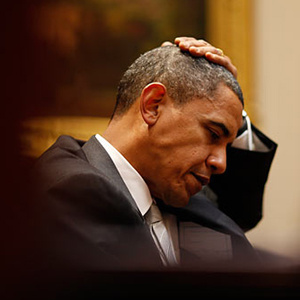Right Track in Afghanistan?

1. According to president Obama the U.S is on the right track to achieve its goals.
2. Al Qaeda and Taliban’s leadership is in its weakest situation since 2001. They possess very limited areas in Afghanistan than before.
3. To improve the situation in Afghanistan and Pakistan it is necessary to promote the political and economic conditions in these countries.
4. The U.S should bridge the gap between Pakistan and Afghanistan.
5. Pakistan must do more to dismantle terrorist havens and to shut down the terrorist connection with its tribal areas.
6. U.S insists on reconciliation with those Taliban individuals who are not affiliated to al Qaeda.
7. The U.S is committed to NATO’s Lisbon summit agreement on withdrawal from Afghanistan in 2014 and handing over the security to the afghan forces.
8. The U.S progress in Afghanistan is fragile and reversible.
To sum up, the U.S president called his strategy on Afghanistan as successful but he was very cautious on his words. Because he knows that there are too many variables which should come together to fulfill his pledges on Afghanistan. I just refer to the above-mentioned points of the Review.
Beginning with the first point, we have been witnessing during two recent years that the U.S administration does not have clear-cut policy toward Afghanistan. The different opinion within Obama administration and especially among the U.S Generals on the ground caused a non-coherent strategy in US administration on Afghanistan. The main difference appeared on adopting the counter-insurgency or counter-terrorism strategy to combat Taliban and al-Qaida.
The second point comes from this wrong analysis that Taliban and al-Qaida fight for land and territory. Of course it would be good for them to achieve land but now they fight to force the foreigners to withdraw from Afghanistan and then in a proper time come back and take control of the situation.
The third point is a long run strategy which can help to eradicate terrorism. But as I mentioned the U.S administration cannot resort to it as a short term strategy and would not work in one or two following years.
The fourth and fifth points which relate to Pakistan, have been the main U.S crisis in the region for several years. Pakistan’s dual policies towards the U.S and Al-Qaida exacerbate the situation for U.S strategies in the region which does not have clear prospect in the future.
The sixth point refers to this fact that the U.S administration differentiates between good Taliban and bad Taliban. This is a grave mistake and as the recent failures prove that cannot be achieved. The identity of Taliban and al-Qaida is interconnected and it is not possible to differentiate them. So this policy won’t help Obama to improve the condition in Afghanistan.
NATO withdrawal from Afghanistan in 2014 and before that, U.S pullout from the country in July 2011 is a crucial moment for coalition troops and specially the United States in Afghanistan. Afghanistan war is Obama’s war. He vowed to pullout U.S troops in 2011. This can grant the vital momentum to Taliban and al-Qaida to accomplish their missions in the country. So this policy is paradoxical in its nature. Not to withdraw from Afghanistan according to the timetable can damage the Obama’s prestige in the verge of us presidential election and on the other hand doing so, can bolster the enemy’s condition in Afghanistan.
The last not the least, is a confession which I think is the crux of the matter. The U.S progress in Afghanistan is fragile and reversible. The 2010 was the bloodiest year for the coalition forces in the country. The negotiation with Taliban has not clear results. Nation and state building in Afghanistan has not any progress. The corruption indexes in the country are high. There is gap between Afghanistan and Pakistan which is getting widening. The afghan officials criticize publicly the U.S policies in Afghanistan etc. These are not good signals to the U.S administration and the day still young to talk about “right track” in Afghanistan.

